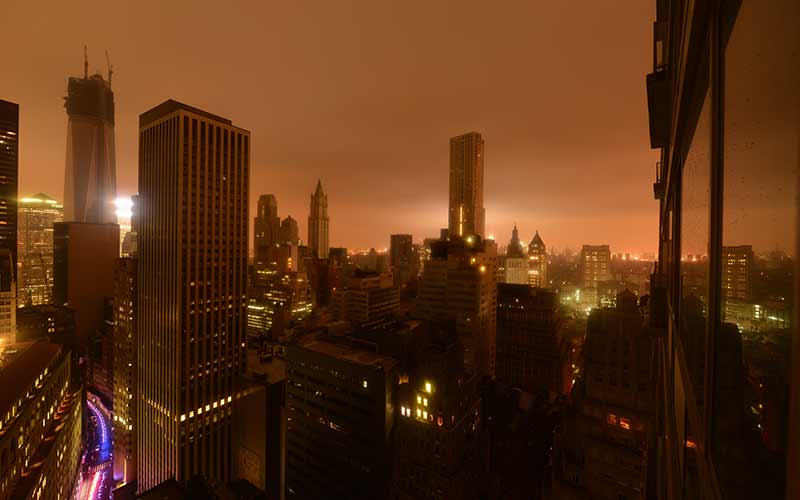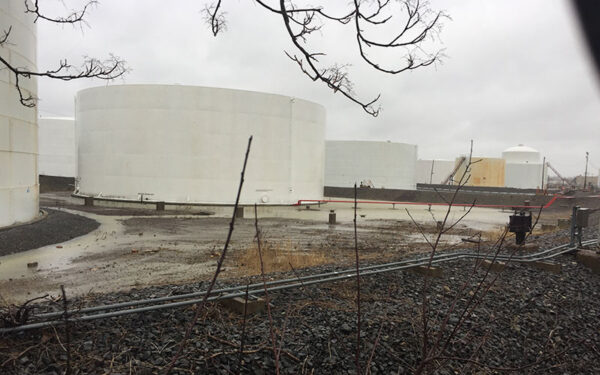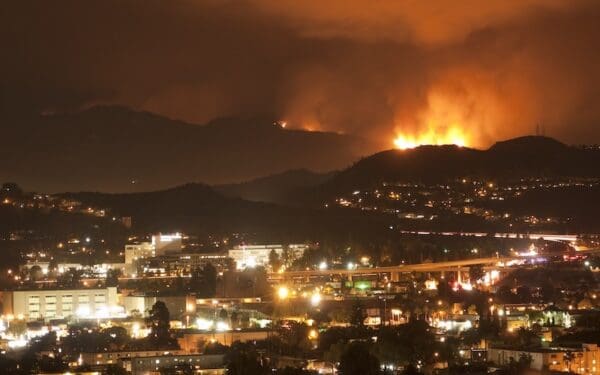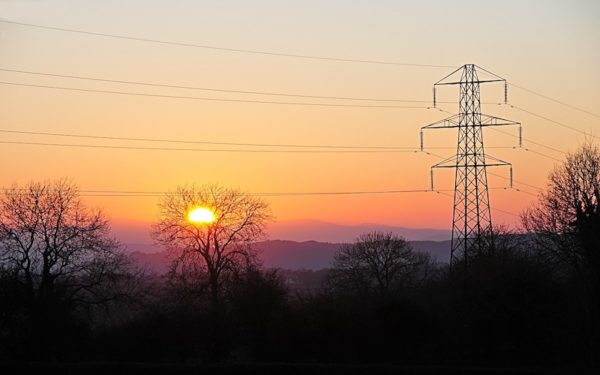
Hurricane Sandy left millions of people in the dark in Manhattan. New England's utilities are no better prepared for the extreme weather that climate change will bring. Photo: Felix Lipov via Shutterstock
If you’ve ever watched a person trip and fall, you know there’s an evolution in their response. At first, they probably tried to regain balance by waving their arms around or shifting their feet. But at some point, they realized they were going down and braced for impact.
Humans are, collectively, falling down on climate change, and it’s time we start bracing for the impact. The world is increasingly taking the threat of climate change seriously. But our slow progress over the last several decades means the first impacts are already here and will get worse – even if we drastically cut our carbon emissions now. Storms have gotten more intense and more frequent, as have heatwaves and cold snaps, and we are unprepared.
If we don’t start bracing for that climate fallout now, people will get hurt. Just last month in Texas, we saw what happens when utility companies fail to prepare for inevitable weather extremes. Millions of people there suffered in freezing weather without heat, power, and water – for days – and upwards of 80 Texans lost their lives. While some of the reasons for that disaster are unique to Texas, no state here in New England has required its utilities to assess their vulnerability to climate change – or take action to prepare for it.
There are also financial consequences of inaction. Take National Grid, a major electric utility company in Massachusetts. In February, the company sought approval from state regulators to pass on to customers the more than $55 million that it spent to repair damage caused by eight storms in 2019. Those storms were completely foreseeable, meaning National Grid should have been prepared for them. But when utility companies are allowed to have customers pick up the tab for damages after the fact, they have no incentive to make necessary the investments needed to prepare for these storms to minimize damage in the first place.
Have Our Utilities Prepared for the Climate Impacts We Know Are Coming?
Ideally, our utility companies would already be doing this planning on their own. However, that work has yet to happen, despite warnings from other regions – Texas, most recently, but also New York during Hurricane Sandy – where utilities were overwhelmed by extreme weather. In Texas, gas and oil plants froze, forcing them to shut down, while in New York, substations exploded as Hurricane Sandy barreled up the coast.
That’s why CLF has petitioned the Massachusetts Department of Public Utilities, urging them to require electric, gas, and water utilities in the state to assess their vulnerability to climate change and create a plan to adapt.
Granted, we may be more prepared for an ice storm than Texas, but not for the other stresses that climate change will put on our grid. Sea level rise, the growing strength and frequency of winter storms and hurricanes, and predictions of heatwaves in New England in coming decades all threaten our electric, gas, and water utilities. Yet, these threats have not been adequately analyzed, much less prepared for.
Without preparation, our utilities could fail in the face of these increasingly erratic climate impacts – just as they already have in other states. We know the dangers of such failures: extended power outages mean our food and medicine can go bad; lack of water can lead to unsanitary conditions in our homes; and no heat or air conditioning can leave the most vulnerable among us, especially children and the elderly, at grave risk from extended cold snaps or heatwaves. When all three happen together – as we saw in Texas – the results are devastating and deadly.
These failures to prepare are not only dangerously shortsighted but also contribute to ongoing race and class inequity. These harms will overburden low-income communities and communities of color because they are more likely to live in flood zones and to face utility shutoffs, leaving them without heating or cooling on fatally cold or hot days. They also have less disposable income to pay the higher utility bills that inevitably result when utilities push the cost of repair onto consumers.
CLF has repeatedly urged Massachusetts to require utilities to ready their infrastructure for what we know is coming. Electric and gas utilities are required to file emergency response plans, but these plans only address how the utility will respond after an emergency. They do not detail how it has prepared to withstand storms, heatwaves, or other regular and anticipated dangers that will only get worse with climate change. That National Grid is seeking approval to pass costs of repair from eight different storms in 2019 suggests that it is not only more extreme weather that is system is unprepared for.
Getting Ready for the Hazards Ahead
The trip-and-fall analogy, perhaps unsurprisingly, has pretty limited applicability to the more complex problem of climate change. The reality is that, even as we strive to avoid catastrophic climate change by drastically cutting carbon emissions, some climate fallout is now inevitable. So, as we push for solar panels, wind power, and electric vehicles, we also need to make sure our major utilities – electric, gas, and water – are prepared for the climate impacts we can no longer avoid.
We can and must protect our communities by ensuring that our heat, water, and electricity providers are safe and reliable. That means not only preventing at-risk infrastructure from being destroyed by an extreme storm but also ensuring that future infrastructure is built with climate in mind. Families and businesses in Massachusetts should not be saddled with the costs of repairing and rebuilding infrastructure because utilities kept their heads in the sand and failed to plan and prepare.
To torture my analogy one more time – when walking down a sidewalk riddled with frost heaves, exposed tree limbs, and missing slabs, you wouldn’t walk with your head in the clouds. You know you would trip and fall. Instead, you would pick your route with awareness of the hazards you face. When it comes to our climate, we need to do everything we can to slow those hazards – and move forward with our eyes open to avoid a major fall.



